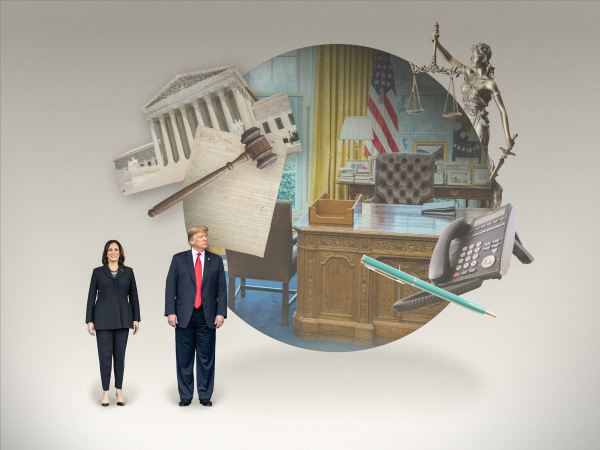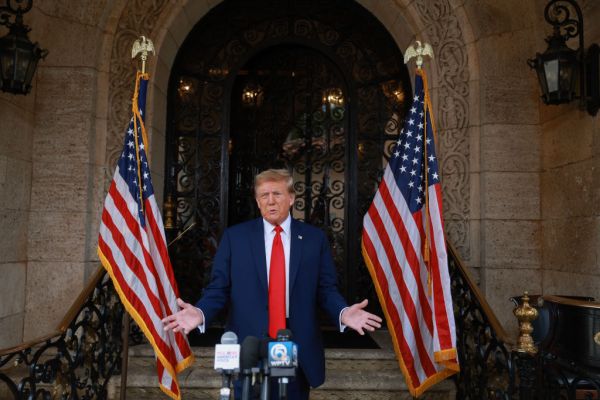We conservatives like to talk (maybe a little too much) about American exceptionalism, but spare a kind thought, dear patriot, for American weirdness.
The United States of America are just what the name says: a union of states, each with its own powers, interests, and idiosyncrasies. It has been that way from the beginning, though the metastasis of the federal government (an unhappy accompaniment of progressive ideology and its so-called rationalism) gradually has given the country a more unitary and less federal character. The original union of states already was large, diverse, and unwieldy, and it has not grown any less so in the years since the revolution. Much of our governmental weirdness is rooted in accommodating that diversity. The biggest politico-economic fault running through our national bedrock was slavery, which, thank God, has been done away with. But many of the big social and cultural divides that complicated national life in the founding era are very much with us: the rural-urban divide, the distinctness and relative poverty of the South, the enduring cussedness of New England, etc. Free trade, to take one example, remains a divisive national issue today for the same reason it was in the 18th century: Its costs and benefits are not evenly distributed, and the economic character of our states and communities is different in different places. Maine’s biggest foreign trade relationship is with Canada (fish and crustaceans) while Nevada’s biggest trade relationship is with Switzerland (precious metals), and the gold business isn’t very much like the lobster business.
Federalism was a big part of how we tried to deal with the challenges inherent in our national complexity and diversity. Some issues are inescapably national, or at least interstate, in character: international relations, including military alliances and international trade; immigration; relationships and controversies among the states. But many of the issues that are today treated as national controversies were issues for the states to handle in the 18th and 19th centuries. For example, the idea that the First Amendment restricts a state government’s relationship with religious organizations would have been big news to the citizens across much of our new republic, given that they lived in states that had actual established churches (i.e. churches with official status supported by the state). Only the federal government was prohibited from creating an established church. Other peculiar features of our national political life, such as the Electoral College or the fact that Wyoming (pop. 581,000) gets exactly as many senators as California (pop. 39 million), also are intended to protect the particular interests of the states, for instance by ensuring that the smaller, less populous states are not powerless against the larger, more populous ones.
Which brings us around to “apportionment.” Stay with me for just a second.
One of the little ironies of American history is that one of the Supreme Court opinions that did the most to ratify the shift of power away from the states and toward Washington is also the source of the famous proverb, “The power to tax involves the power to destroy.” (That case, McCulloch v. Maryland, stopped Maryland’s attempt to hinder the operations of the Second Bank of the United States by taxing its notes. That was Maryland in its Jacksonian era.) The federal taxation power is very carefully defined—and limited—in the Constitution, to such an extent that the 16th constitutional amendment was required to permit Washington to impose a national income tax on the country. The Constitution distinguishes between “direct” taxes, meaning internal taxes, and other kinds of levies, which, at the time the Constitution was written, mostly meant tariffs on imported goods.
Direct taxes, according to the Constitution, must be “apportioned” among the states, meaning that they have to be roughly the same on a per-capita basis in every state. The revolutionary slogan, “No taxation without representation!” can be heard in echo in the language of Article 1, Section 2, which explicitly connects representation and tax apportionment: “Representatives and direct Taxes shall be apportioned among the several States which may be included within this Union.”
Under the Articles of Confederation, our original national charter, the federal government had no power to levy taxes. (That is one reason midcentury libertarian radicals such as Murray Rothbard advocated, quixotically, a return to the Articles.) When the federal government needed money, it “requisitioned” it, meaning that it sent a bill to the states requesting that they pay a sum of $x/capita, the burden of the requisition falling evenly on the several states according to their populations. That didn’t work very well. One of the reasons the framers scrapped the Articles of Confederation and adopted the Constitution in its place was to empower the federal government to collect taxes. But they did not—and would not have been permitted to—give the federal government an unlimited power to tax. Apportionment was a compromise between the federalist empire-builders and the anti-federalist spirit that animated politics in much of the country far from the urban commercial centers.
Because an income tax is a direct tax in the constitutional sense, and because such a tax is impossible to apportion among the states on a per capita basis, the 16th Amendment was passed, reading: “The Congress shall have power to lay and collect taxes on incomes, from whatever source derived, without apportionment among the several States, and without regard to any census or enumeration.” The federal government needs money to do things, though one need not be an anarcho-capitalist radical to appreciate that the federal income tax has not been an entirely unmixed blessing. But say this much for it: It isn’t a wealth tax.
Not yet.
My colleagues at the Competitive Enterprise Institute (where I am a writer in residence) are taking the lead in what will be, almost certainly, the most significant case the Supreme Court hears in its next term: Moore v. United States. (Do not confuse it with the surveillance case of the same name.) Like many such cases, this one really involves, at heart, very little more than the question of whether the Constitution says what it actually says or whether the government can, citing needful exigencies, simply pretend that the Constitution says whatever the powers that be in Washington decide it needs to say on any given day.
Charles and Kathleen Moore invested in a social enterprise in India, KisanKraft Machine Tools Private Limited, which helps Indian farmers in poor and underdeveloped areas improve their businesses—and their lives—by acquiring more modern equipment. KisanKraft now employs hundreds of people in India and has helped a great many marginal farmers—and their families and communities—improve their economic situations by means of their own work and enterprise, not as clients of some political patron or as dependents on some charitable program. (The next time someone tells you free-market economics is for people who care only about themselves … ) KisanKraft is one of those businesses that exists to make a difference rather than a profit, and, for that reason, it reinvests all of its earnings into the business itself. The Moores have never received a penny of income from their investment in the firm, never expected to, and, barring some unforeseeable development, never will.
But, thanks to the special kind of imbecility that can be produced only by the intellectual fusion of Donald Trump with Elizabeth Warren, the Moores have been given a tax bill not for any income they have realized from their investment—of which there is $0.00—but for imaginary income. KisanKraft could have paid out dividends to its investors, who would then have investment income to pay taxes on. But KisanKraft did not do that. Donald Trump, who has the resume of a villain from an unpublished Ayn Rand novel—second-rater, inherited money, serial business failure, corrupt, seething with hatred for people who succeed in the businesses he failed at—has spent years railing at American investors and businesses with the unpatriotic gall to invest in overseas businesses (that are not golf courses), and in 2017 congressional Republicans, caught up in that unsavory nationalist-populist moment, produced the grievously misnamed Tax Cuts and Jobs Act, which imposed a “one time” (“It’s only this once, we promise!”) tax on unrealized overseas investment income, simply “deeming” profits to have been realized and repatriated for tax purposes. It was one of the dumbest policy ideas of a remarkably dumb era. Of course, it was supposed to wring money out of the scheming shifty corporate “fat cats” who populate the fever dreams of well-heeled Washington populists.
Of course, it landed on people like the Moores.
If you own stocks, an IRA, or a house, then you are familiar with the fact that the valuations of such assets will from time to time go up and—alas!—down. If your house is worth $100,000 more today than it was 10 years ago, you have not actually made $100,000. You may make $100,000, if your house is still worth $100,000 more than you paid for it when you sell it. If you have a nice nest egg for your retirement, you can drive yourself crazy checking in on your account, noting that you “made” $10,000 one day and “lost” $10,000 the next. Of course, you don’t actually make any money until you sell the asset and realize the gain, just as you don’t actually lose any money unless you sell the asset and realize the loss. When a firm reinvests its revenue in the business rather than paying money out as dividends, that will, in theory, increase the value of the business, thereby increasing the wealth of the shareholders who own it. But that is wealth, not income—and it is not as though there is some linear relationship between reinvested business income and the value of the business.
And it is not as though your house value or your IRA moves only in one direction: up. India has a complicated business environment, and the Moores could lose every penny they have invested in KisanKraft without ever collecting a single lonely rupee in actual income.
What the 2017 Tax Cuts and Jobs Act did was clear the way for the wealth tax Sen. Elizabeth Warren and other multimillionaire class warriors wish to impose on Americans who are a little wealthier than they are. (Speaking of American weirdness, how weird is it that our class-war politics mostly pits millionaires and billionaires against other millionaires and billionaires? It is not as though the masses are crying out, with one voice, for a mandatory corporate repatriation tax—what the plebs want is to be able to afford a house.) If the federal government can treat unrealized income as though it were real income, then the constitutional limits on the federal government’s taxation powers—which were put in place for a reason—will have been completely undermined.
Treating unrealized gains as though they were real income is not a tax on income at all—it is a tax on wealth. The 16th Amendment does not authorize a tax on wealth; and, as a practical matter, the Constitution’s apportionment rule makes a federal wealth tax impossible.
Wealth taxes aren’t necessarily god-awful: You probably pay a local wealth tax on your house, and some reasonably well-governed countries (such as Switzerland and Norway) have modest wealth taxes at the national level, though some, including such progressive beaux idéals as Denmark and Sweden, have abandoned wealth taxes, finding them impractical because of the relatively high cost of administration and the relatively low production of revenue. But the question going to the Supreme Court isn’t whether such a tax would be a good idea as policy: The question is whether a wealth tax disguised as a tax on hypothetical income is constitutional. It is very difficult to see how it is, the 9th Circuit’s creative nonsense about “disregarding the corporate form to facilitate taxation” notwithstanding. Income is money that comes in—hence the word. Unrealized appreciation of an ownership stake is an asset, not income.
An asset may produce income—or, as a former newspaper editor with some Journal-Register Co. stock-option paperwork filed away in a folder labeled “You Are Not as Smart as You Think You Are” can tell you, an asset may not produce income. As the commercials say, investing involves risk.
KisanKraft could have paid the Moores a dividend. But it didn’t. The 16th Amendment could have legalized wealth taxes. But it didn’t. The people who passed the 16th Amendment could have repealed the Constitution’s apportionment rule. But they didn’t. The law could say something else rather than what it says.
But it doesn’t.
It’s a weird country, sure. But I prefer it this way. And it works.
Economics for English Majors
If you want to imagine the kind of chaos I’ve written about above, consider the fact that Amazon’s shareholders saw an on-paper gain of $1 trillion between March of 2020 and July of 2021—a gain that was lost by December of 2022. What do you do when you’ve taxed shareholders on $1 trillion in gains that turned out to be transitory? “No backsies”?
Sen. Warren and other like-minded class warriors occasionally—very occasionally—hesitate when it comes to business taxes, worried that they will create disincentives to invest in the United States and incentives to offshore. Well—imagine that!
I will here repeat my advice to policymakers worried about overseas tax havens: Be the tax haven! Low taxes don’t mean Mad Max stuff, as my progressive friends sometimes insist: The United States has a relatively high corporate income tax rate, higher than the world average and higher than Scandinavian welfare states such as Denmark. When it comes to capital gains, prosperous Switzerland gets by with no national tax on them at all. Spend a little time in Copenhagen or Zurich and tell me if that looks like dystopia to you.
Being a tax haven works out pretty well for places such as the Cayman Islands. Imagine having a very attractive tax environment while also having the most productive, dynamic, and innovative economy in the world, the world’s best system of higher education, the world’s most sophisticated venture capital industry (assuming we don’t murder it), and the largest national economy on earth.
Be the tax haven.
Words About Words
Words that don’t mean what the authors sometimes think they mean: bombastic and semiautomatic. From Salon: “After publicly boycotting Bud Light, Kid Rock is quietly serving the beer at his Nashville bar: This is another example of conservative politicians walking back on bombastic public boycotts.” I am pretty sure that Kid Rock is not a “conservative politician,” or a politician of any kind. But, never mind that for the moment: Bombastic does not mean “overly emotional” or “excited” or anything like that: It refers to language that is artificially refined or formal, made high-sounding in an attempt to sound smart, “high-sounding but with little meaning,” as the Oxford people put it. Kid Rock is many things—“high-sounding” is not one of them. Ask Salon:
“F**k Bud Light, f**k Anheuser-Busch,” Rock said in a viral video before shooting a semi-automatic weapon at cases of the beer.
As you can tell from the video, Kid Rock is not firing a semiautomatic weapon—he is firing a fully automatic weapon, a machine gun. Gun control advocates pretty routinely confuse the two, often in ways that might seem, to a cynical man, very possibly intentional.
English—how does it work?
Kid Rock knows something about how English works. He may not be bombastic, but he is clever—a lot of high-sounding writers never produce a line as economically humorous as “roll in the Fleetwood, that’s how I mack.”
(To mack is to act as a pimp; a Fleetwood is a model of Cadillac; Fleetwood Mac is . . . all right, you get it.)
And not to keep picking on the poor nitwits who write for Salon, but Indiana Jones does not wear a Panama hat, for Pete’s sake.
Making his way back home, he’s met by the very robbers he tried to outsmart and although he loses the cross to them, he’s awarded for his gumption by the head thief (Paul Maxwell), who takes off his Panama hat and puts it on Indy’s head. Now his “costume” is complete.
(The error has since been amended without acknowledgement.)
Elsewhere
You can buy my most recent book, Big White Ghetto, here.
Do check out my CEI-commissioned “Inside the Carbon Cult” reports, here.
You can buy my other books here.
You can see my New York Post columns here.
In Closing
Every time I see a headline that says the sun is doing something a little bit weird, I worry. If you have read my work for a while, then you probably know that one of my themes is sharks vs. cows: You are a lot—a lot!—more likely to be killed by a cow, a deer, or a bee than you are to be eaten by a shark, but we worry about shark attacks, because shark attacks are terrifying at some deep weird atavistic level. It’s probably an evolutionary thing, which is why lots of people have phobias about spiders and snakes but not about, say, napalm or other modern terrors that we haven’t had time to evolve a deep-seated fear of. But if there is a go-to example of something that is outside of our control, then surely the activity of the sun is the textbook case. Statistically unlikely things do happen—1-in-200 million events happen—but it is best not to use lottery tickets as your retirement plan, it is best if you buy health insurance, etc., best to take care of the things that are within your control. If you had asked me when I was 20 for a breakdown of what’s in my control vs. out of my control when it comes to the important things in life, I probably would have said 80/20 in my control. At 50, I think I’d reverse those proportions. At 80, I guess I’ll be down to 3 or 4 percent. Part of me wants to believe that this is wisdom, but mostly (80/20?) I know better than to suspect myself of that.









Please note that we at The Dispatch hold ourselves, our work, and our commenters to a higher standard than other places on the internet. We welcome comments that foster genuine debate or discussion—including comments critical of us or our work—but responses that include ad hominem attacks on fellow Dispatch members or are intended to stoke fear and anger may be moderated.
You are currently using a limited time guest pass and do not have access to commenting. Consider subscribing to join the conversation.
With your membership, you only have the ability to comment on The Morning Dispatch articles. Consider upgrading to join the conversation everywhere.